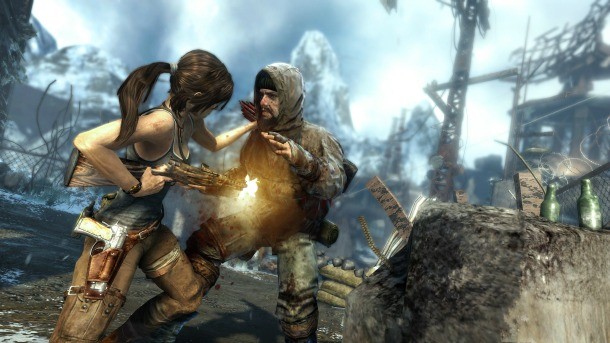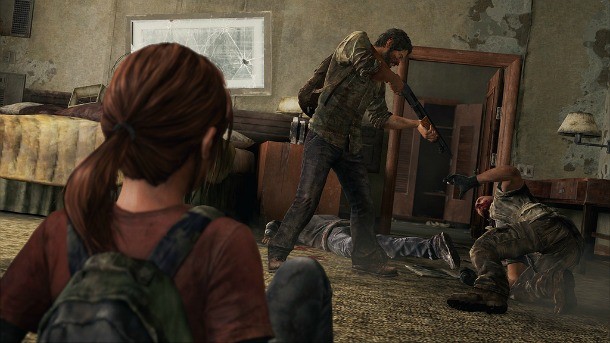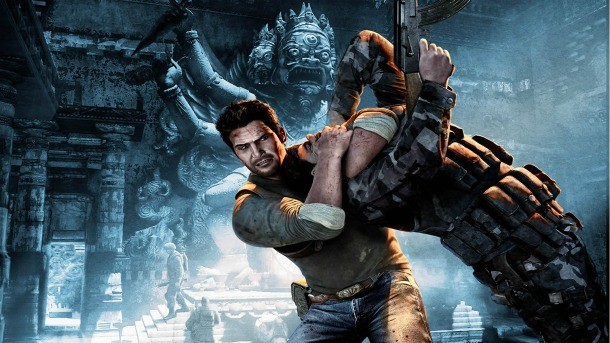Why Narrative Disconnect Is Worth Talking About

If Lara Croft is just a girl trying to survive, why is she so good at remorselessly mowing down bad guys? If Nathan Drake is a charming, relatable everyman, how should we feel about the fact that we control him as he kills hundreds? As video game storytelling has improved, the idea that gameplay design can conflict with the game’s narrative has become a hot-button topic for gamers. There’s a lot of disagreement within the community as to how it should be addressed. Some people dismiss it as nitpicky whining; others acknowledge it as a legitimate concern, but seem to think of it as insurmountable or damaging to the industry. While I can sympathize with these responses, I don’t think either of them are the right way to talk about the issue.
It isn’t pointless to talk constructively about issues that come from trying to tell a story in a video game, and they shouldn’t be avoided as impossible to overcome or use, either. I think the fact that narrative disconnect in video games is being talked about should be seen as an opportunity – by making these issues a part of our conversation in the right way, we can pave the way for exciting new ideas in how video games are designed and received as entertainment and art.
The idea of a narrative disconnect caused by gameplay design has gotten progressively more attention in recent years, and has been called a lot of things. Clint Hocking famously coined the term “ludonarrative dissonance” in his 2007 article “Ludonarrative Dissonance in Bioshock” to help explain why he thought BioShock’s gameplay rendered the points the story was trying to make ineffective or contradictory. Amy Hennig, creative director of the Naughty Dog series Uncharted, described the concept as “the uncanny valley of narrative,” and acknowledged that her team looked for creative ways of overcoming it. Whether it’s called “game-isms,” “ludonarrative dissonance,” or “gameplay/narrative disconnect,” the phenomenon has been the subject of numerous articles, and in some cases has even affected the critical response to titles like Uncharted, Max Payne 3, Tomb Raider, Far Cry 3, BioShock Infinite, and The Last of Us.

Some critics felt that making Ellie invisible to enemies in The Last of Us took away from the tense emotions of combat, as players wouldn't have to worry about Ellie being harmed.
While critical circles have begun to talk about the gameplay/narrative disconnect, the concept has largely been marginalized within the gaming community. Even using the term “ludonarrative dissonance” online is often an invitation for ridicule. Unfortunately, it’s completely understandable that so many gamers would react this way. The issue of narrative disconnect is, like so many other legitimate topics, often hijacked and used either to antagonize a community into anger or to make an arguer look intellectually superior and inaccessible.
It’s easy to see how narrative-disconnect trolling could happen. I control Joel in The Last of Us; if I choose, he can just run into a wall for three hours or shoot all his ammo at Ellie. That’s a disconnect between gameplay and narrative, as is every other stupid thing you could choose to do with controllable characters. So obviously, talking about disconnects between a game’s design and its story is pointless and silly. After all, it’s just a video game.
This is probably the most common complaint that comes up in these conversations. The point made is that video games aren’t meant to be taken so seriously, and that thinking about how gameplay interferes with narrative is missing the intention of having fun. For a lot of gamers, analyzing a game at this level feels too serious or academic – or even worse, it feels like we’re poking fun at the entertainment they love, pointing out flaws just to mock them.
While it’s OK to use narrative disconnect to point out a game’s limitations, the proper usage of any critical topic (not just disconnect) is constructive. The idea should be used to stimulate interesting conversation about what a game did or didn’t do to draw the player in, or what it could have done better. People who say things like, “It’s just a video game,” are being just as reductive as if they had said, “It’s just a book,” or “It’s just a movie.” A lot of entertainment requires suspension of disbelief, but that doesn’t mean we can’t have fun, interesting conversations about it. Talking about narrative disconnect can easily be done without taking games too seriously, and just because someone doesn’t want to doesn’t mean they should be allowed to dismiss the topic as unworthy.
Up next: Why gameplay/narrative disconnect isn’t inaccessible, and why talking about it will help, not hurt the game industry

Near the end of Uncharted 2, antagonist Zorin Lazarevic points out that Drake's capacity for mass murder doesn't align well with his supposedly charming persona.
This kind of debate isn’t the only problem for this topic, however. In fact, oftentimes the “It’s just a video game” argument develops in response to the second way the concept is misused. Topics like these tend to have a reputation for being inaccessible, and a lot of the conversations that take it into account makes themselves inaccessible to others on purpose. This leads to resentment from those gamers who are excluded, making it easy for the topic to be branded pretentious, pointless, or only for people who don’t really like video games.
This is a misuse, because properly applied narrative disconnect can be the opposite of all that. Just about everyone has experienced some form of dissonance between narrative and gameplay at one point or another, whether that was just joking about a silly facet of gameplay or feeling turned off by a character behaving in a way that you didn’t think they would.
Integrating gameplay and narrative is an important part of what makes video games fun – you want to feel like you’re actually participating in a story. The fact that it’s so integral to the gaming experience means not only that narrative disconnect is important – it means everyone who plays games can talk about it.

GTA V protagonist Trevor was meant parody the mentality of the typical Grand Theft Auto player, so that any action the character did in-game, no matter how horrifying or random, made sense in-universe.
There are plenty of people who would agree that the concept shouldn’t be ridiculed who still think we shouldn’t spend time thinking about it. Several critical articles published on the subject suggest that, if taken too far, it could be damaging to the industry. Games as they are being made now, according to this argument, tell compelling stories and have great gameplay while not considering disconnects. If we force developers to prioritize making gameplay that integrates with their narrative, we’ll be restricting their ability to make the games they want, and therefore making gaming worse.
If dismissing or ridiculing the concept of narrative disconnect doesn’t give gamers enough credit, this other position doesn’t give game developers enough credit. Games are first and foremost entertainment, and game developers are entertainers. Above all, a game is supposed to be fun. I don’t think that’s changing anytime soon, nor should it. There’s no way that gamers talking about an issue that many developers have already admitted is on their radar will somehow force games to be less fun. At worst, the concept would not become a real consideration, and little would change. That’s all we have to lose.
I believe a deeper discussion about game narrative presents a great opportunity, for both developers and fans. When an artistic or entertainment medium comes up against the limitations of its form, that medium has to evolve to adapt. In literature, film, or any other medium, this challenge has historically created some of the most exciting art and entertainment ever. Now we’ve encountered a limitation that is specific to video games. Movies and books don’t have to worry about making their story match their gameplay. I believe creative developers rising to the challenge of overcoming narrative disconnect can revolutionize video gaming the same way other art revolutionized itself: by examining and adapting to its own limitations.
I’m not advocating for video games to fundamentally change, or saying that concepts like these are the most important thing developers should consider going forward. There are plenty of games that already deal with disconnect in interesting and engaging ways, and there are a lot of video games that simply aren’t applicable to this discussion. Everyone who loves video games wants the same thing: for video games to be fun and exciting. That’s why so many gamers get defensive when discussing narrative disconnect, but it’s also why I think we have so much to gain from discussing it properly. So when I argue for more discussion of the relationship between gameplay and story, I’m doing so because I really think addressing the challenges that follow in an earnest, excited way can lead to even better conversations, and even better video games.

Get the Game Informer Print Edition!
Explore your favorite games in premium print format, delivered to your door.
- 10 issues per year
- Only $4.80 per issue
- Full digital magazine archive access
- Since 1991









